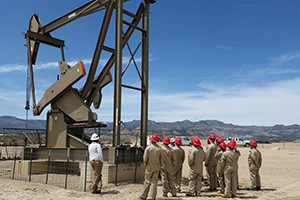
It has been some 20 years since Alan Walker had been involved in what he calls the “hardcore” aspects of engineering. He began his career as a petroleum production engineer in Wyoming, but when he transitioned to management those hands-on engineering skills were used less frequently.
Now Walker, who is the director of technology outreach for Utah Science, Technology and Research (USTAR), is back up to speed in the ever-evolving oil and gas industry thanks to the University of Utah’s new Master’s of Science degree program in petroleum engineering. Walker is among the program’s first five graduates, all whom received the degree in time for graduation in May.
“When I started as a petroleum engineer 30 years ago we did not have horizontal drilling, we did not intentionally produce oil or gas from shales, we did not have sophisticated computer modeling of reservoirs and stimulation techniques. In addition to re-learning all of these things I used to know, I had to become familiar with all of these recent innovations,” Walker said. “The petroleum engineering master’s degree program was a convenient way to get my skills back up to where they used to be.”
Starting in 2013, the petroleum engineering degree program has been offered by the U’s chemical engineering department. This 16-month, 33-credit-hour program has been designed particularly for working professionals because it can be completed online at their own pace. Not only does it explore petroleum engineering fundamentals and technologies, it also covers political, economic and environmental issues relevant to the industry.
More than a dozen leading energy companies including ConocoPhillips, XTO, Savage Energy, Fidelity Exploration, Resolute Energy, Wolverine Gas and Oil, PacifiCorp, Integrated Energy Services, Crescent Point, MCW, Questar, Halliburton, and Williams have partnered with the program to give students experience in the field.
“The program was originally designed for working professionals in order to refresh and extend their skill sets and allow them to take on management roles,” said the petroleum program’s director, John McLennan, who also is a U chemical engineering associate professor. “It allows people to advance within their organizations or embark on career changes. Many working professionals can’t attend classes, so the online option is extremely popular and has worked very well.”
Nigatu Workneh took advantage of that course flexibility. As an engineer for oil field services company, Baker Hughes, he was able to take the classes online from Denver and only had to come to Utah for a three-week field study.
“For me, it was very helpful,” he said about the course’s flexibility. “You do your work at night or on weekends or after work. That was the most convenient way.”
Meanwhile, Workneh also got important on-site experience by visiting engineering facilities, production operations, and geologic analogs in Utah and Wyoming. “What was good exposure was that hands-on experience,” he said. “A guy like me already has experience, but on this field trip I was able to learn the geology aspect as well as drilling and production. It’s the total package.”
Meseret Belayneh, a student in the program who recently received his degree while working as a field engineer for Baker Hughes in New Mexico, said the program will provide more opportunities for him in the future.
“When you want to explore deeper into the industry, like reservoir engineering or production engineering or drilling, you need more of that education. That will help you secure a job in the future,” Belayneh said. “With this degree, the sky’s the limit, and it’s going to open a lot of doors in the oil industry.”